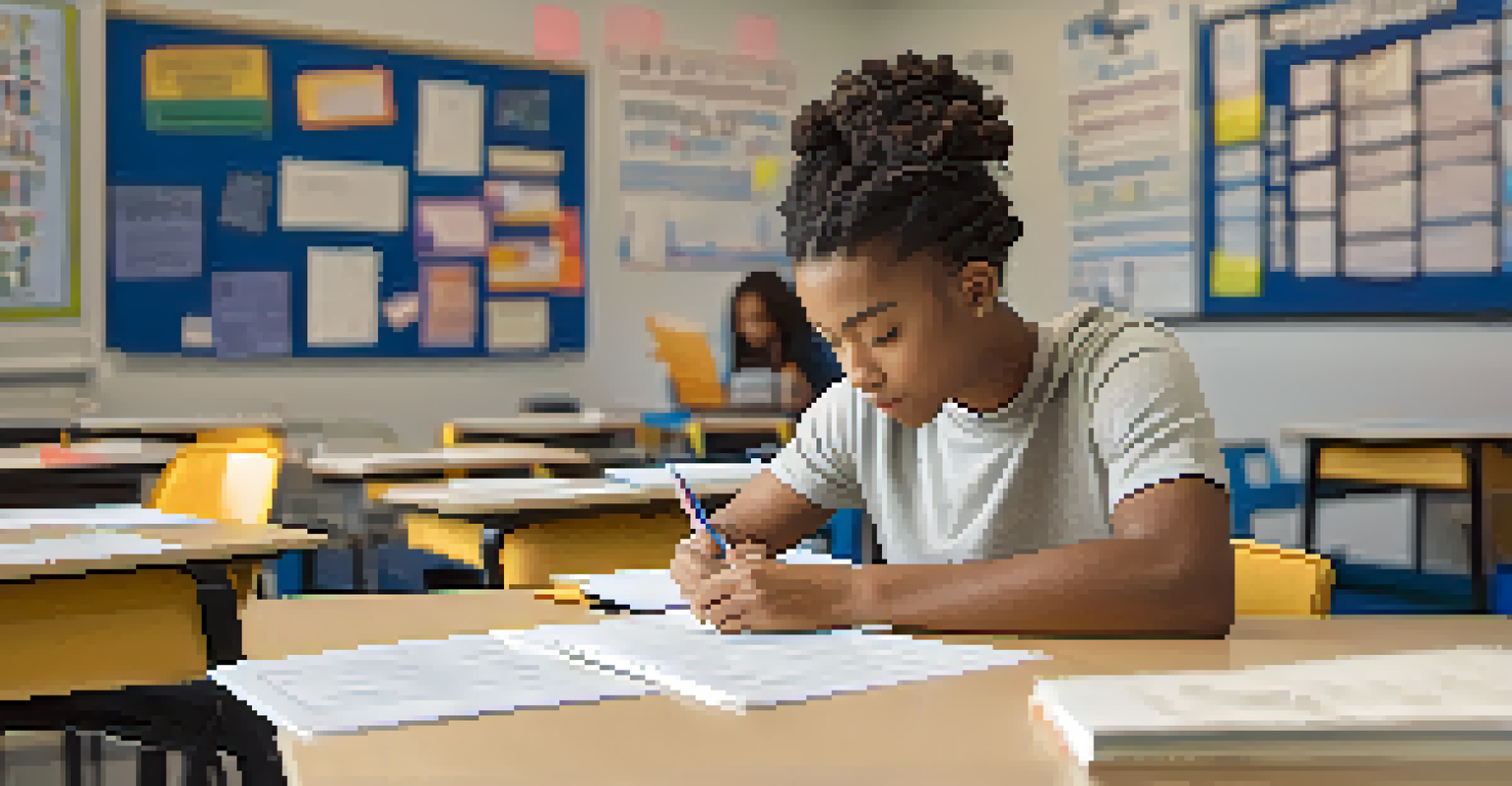The Importance of Self-Assessment in Learning Processes

What is Self-Assessment and Why is it Important?
Self-assessment is the process of evaluating your own learning and performance. It enables learners to recognize their strengths and weaknesses, which is crucial for personal growth. By reflecting on their experiences, individuals can set realistic goals and develop a clearer understanding of their learning journey.
We do not learn from experience... we learn from reflecting on experience.
This practice encourages learners to take ownership of their education, fostering a sense of accountability. When students assess their own work, they become more engaged in the learning process, making it more meaningful. Ultimately, self-assessment is about empowering learners to take charge of their learning.
Furthermore, self-assessment can help identify gaps in knowledge, prompting learners to seek additional resources or support. By understanding where they stand, individuals can tailor their learning strategies to better suit their needs. This proactive approach not only enhances academic performance but also builds confidence.
The Benefits of Self-Assessment in Learning
Self-assessment provides numerous benefits that can significantly enhance the learning experience. For instance, it promotes critical thinking by encouraging learners to analyze their work. This analytical approach helps develop problem-solving skills, as individuals learn to identify areas for improvement and devise solutions.

In addition to fostering critical thinking, self-assessment boosts motivation. When learners see their progress, they feel a sense of accomplishment, which can drive them to set higher goals. This intrinsic motivation is vital for sustained learning and can lead to a lifelong love of education.
Self-Assessment Enhances Learning
Self-assessment empowers learners to evaluate their strengths and weaknesses, leading to personal growth and improved academic performance.
Another key benefit is improved self-awareness. Through self-assessment, learners gain insights into their learning styles and preferences. This knowledge allows them to adopt more effective study techniques, ultimately enhancing their overall academic performance.
How to Implement Self-Assessment Effectively
Implementing self-assessment doesn't have to be complicated. Start by encouraging learners to set clear, achievable goals for their studies. These goals serve as a benchmark against which they can measure their progress, making self-assessment more structured and focused.
Self-assessment is a critical skill for lifelong learning, enabling individuals to reflect on their progress and make informed decisions about their future.
Next, create opportunities for reflection. This can be done through journaling, discussions, or guided questions that prompt learners to think critically about their work. Reflection helps individuals process their experiences, making it easier to identify areas for improvement.
Lastly, provide tools and resources to support self-assessment. This could include rubrics, checklists, or reflection templates. These resources can guide learners in their evaluations, ensuring that self-assessment is both meaningful and productive.
Challenges of Self-Assessment in Learning
While self-assessment offers many benefits, there are challenges that learners may face. One common issue is a lack of objectivity. It can be difficult for individuals to evaluate their work without bias, leading to either inflated or overly critical assessments.
Another challenge is the potential for procrastination. Some learners may avoid self-assessment altogether, fearing the confrontation of their weaknesses. This avoidance can hinder personal growth and prevent them from achieving their learning goals.
Critical Thinking and Motivation
Engaging in self-assessment promotes critical thinking and boosts intrinsic motivation, encouraging learners to set and achieve higher goals.
To overcome these challenges, it's essential to foster a supportive environment. Encouragement from educators and peers can motivate learners to engage in self-assessment. Additionally, teaching strategies for objective evaluation can help individuals become more accurate in their assessments.
Self-Assessment in Different Learning Environments
Self-assessment can be applied in various learning environments, from traditional classrooms to online courses. In a classroom setting, teachers can incorporate self-assessment through assignments and projects. This engagement encourages students to reflect on their learning and connect it to their overall progress.
In online learning, self-assessment is equally vital. Digital platforms often provide tools and resources that facilitate self-evaluation, allowing learners to track their progress easily. This accessibility makes it easier for individuals to engage in self-assessment, regardless of their learning environment.
Furthermore, self-assessment can be adapted to suit different age groups and learning styles. Whether in primary education or adult learning, the principles of self-assessment remain the same, making it a versatile tool for enhancing learning.
The Connection Between Self-Assessment and Goal Setting
Self-assessment and goal setting go hand in hand, as one process informs the other. By evaluating their strengths and weaknesses, learners can set realistic and achievable goals. This alignment between assessment and goals ensures that learners are focused on areas that truly matter.
Moreover, setting specific, measurable, achievable, relevant, and time-bound (SMART) goals can enhance the self-assessment process. When learners have clear goals, they can better evaluate their progress and adjust their strategies accordingly. This dynamic feedback loop creates a more effective learning cycle.
Challenges Require Support
While self-assessment has many benefits, challenges like lack of objectivity and procrastination can be overcome with a supportive environment.
Ultimately, the synergy between self-assessment and goal setting empowers learners to take control of their educational paths. By continuously assessing themselves against their goals, they can make informed decisions about their next steps, leading to more meaningful learning experiences.
The Future of Self-Assessment in Education
As education evolves, self-assessment will play an increasingly vital role. With the rise of personalized learning and technology, self-assessment practices are becoming more accessible and effective. Digital tools can provide instant feedback, allowing learners to engage in self-assessment in real-time.
Furthermore, the growing emphasis on social-emotional learning highlights the importance of self-assessment in developing self-awareness and resilience. Educators are recognizing that self-assessment is not just about academic performance but also about fostering personal growth.

In the future, we can expect self-assessment to be integrated more seamlessly into educational curricula. By embracing this practice, we can create a generation of learners who are not only knowledgeable but also self-aware and capable of navigating their own learning journeys.